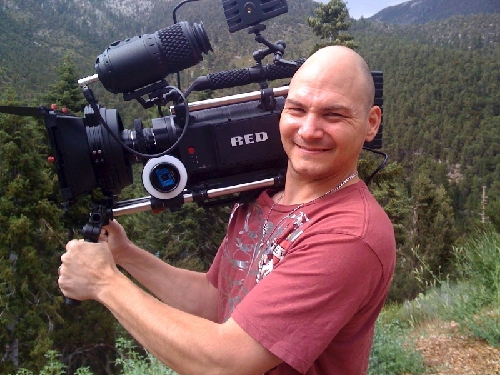Lack of incentives blamed for state’s failure to lure filmmakers
Nevada's film industry is hurting because other states are offering tax credits or rebates to production companies that shoot within their borders, an official says.
Nevada offers no formal incentives to entice moviemakers.
"Incentives that other states are offering are hurting us," said Charlie Geocaris, director of the Nevada Film Office.
In 2009, annual production revenue for the Nevada Film Office was about $102.4 million, and 340 productions were filmed in the state. In 2008, the annual revenue was about $110.5 million and 440 films were produced in Nevada.
Geocaris said New Mexico is Nevada's No. 1 competitor, and it offers a 25 percent transferable tax credit.
"Dollar for dollar, these other states have been winning out," Geocaris said.
Jobs and millions of dollars have been lost to New Mexico in the past few years since its program was instituted, Geocaris said. Utah, which Geocaris noted also is a close competitor to Nevada, offers filmmakers a 20 percent rebate or tax credit. The Utah Governor's Office of Economic Development presented a proposal to its state lawmakers recently that called for an increase in the rebate to as much as 30 percent.
Also on Geocaris' radar is Michigan, which offers a 40 percent incentive. Because of recent increases in its film industry, Michigan is building a permanent infrastructure to accommodate movie houses.
"They're seeing more production than ever," Geocaris said. "It's quite amazing."
Geocaris said it doesn't matter if a story is written specifically for Nevada --it can be filmed in other states. Five years ago, movie sets were all about location. If a filmmaker needed a ghost town or Lake Tahoe, he or she came to Nevada. Now, decisions are made based on incentives.
"The creative end of it has been kind of pushed aside," Geocaris said.
He noted that scripts can be and often are reworked to fit into a state's geography if that location is offering an attractive incentive program.
"It's kind of sad in a way," Geocaris said.
Jeremy Settles, owner of Gotfilms, a full-service film and video production company, said the local industry is hurting because of a lack of ground rules in place.
"The Defenders," for instance, is a television show set in Las Vegas about two Las Vegas attorneys. Settles said the pilot was shot here, but once the show was picked up a set was built in Hollywood and the Las Vegas industry won't receive any more work from that project.
"That's the last you'll ever see of them," Settles said.
If the state sets forth rules to protect the use of its image and landscape, Settles suggested that would help create and protect jobs for local film industry people. He also said that out-of-state-production companies should be required to assemble a film crew that includes local professionals when in town using Nevada's locations. He said crews should hire locally at a rate of at least 50 percent.
"There's a lot of technical people here, but the jobs aren't coming in," Settles said.
The Nevada Film Office, which is overseen by the Nevada Commission on Economic Development, has tried to initiate a state incentive program in the past, but hasn't been able to introduce a bill to the Nevada Legislature. There is, however, a grass roots effort led by JR Reid, the owner of JR Lighting, to get a bill on the floor during the next session, which starts Feb. 7. His website, nevadafilmincentive.com, was created for people to show support to the bill and stay informed about its progress.
"In the past it's been very difficult because the film office has been the lone voice," Geocaris said. "It's something that Nevada needs to do."
Reid cited lost business as his foremost reason for promoting a bill to pass film incentives. He said that five years ago Las Vegas had about an 80 percent market share. Today, he thinks the city has about a 20 percent market share.
"That's crazy," Reid said. "We're Las Vegas."
Even for films that need shots in Nevada, Reid said many times a production will stay in the state for the minimum time required before moving on to a more budget-friendly locale.
"Producers only understand money," he said. "Film incentives are a must."
At his own business, Reid had to lay off about 30 percent of his staff during the past two years.
"A lot of people have left Nevada because they can't find work here," he said.
When trying to gain a filmmaker's business, the Nevada Film Office tries to level the playing field between Nevada and other states by pointing out the Silver State's favorable qualities. Examples of positives on the list are: Nevada offers an abatement of room tax after 30 days, mostly days filled with sunshine and landscapes that could serve as geographical doubles.
Marko Sakren, founder and director of the Nevada Film Alliance, has worked in the Las Vegas industry since 1993. Sakren hopes that in addition to attracting out-of-state business, Nevada-based production companies can create more homegrown films from local resources so that revenue can be generated from film profits. As of now, he said, not much is happening in that vain.
"We have to strive to get there," Sakren said.
He noted there is movement in the local business among studios, film festivals and production companies to make strides toward creating movies from a majority of local resources.
"We're walking now, not running," Sakren said. "We're all itching to run."
For his part, Sakren is packaging four local projects and hopes to begin raising funds for a projected early 2011 start date.
"I'm doing the best I can in my simple, humble way," Sakren said.
Settles, too, thinks that Nevada can move its own film industry forward by creating mostly local projects. His company is developing a television series and he plans to shoot the trailer in December.
"I try to use as much local talent as possible," Settles said.
Aside from the television series, Settles and his business partner look for scripts related to or that can be adapted to Las Vegas and the surrounding area in the hopes that they can be developed into screen projects.
Contact reporter Laura Emerson at
lemerson@lvbusinesspress.com or 380-4588.

















